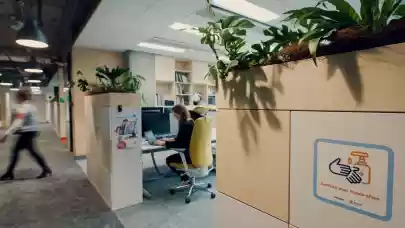
According to the latest, fourth edition of a survey conducted by Zymetria (an analytical and research company) on behalf of Skanska's commercial development business unit, after two years of the coronavirus pandemic, 9 out of 10 Polish office employees believe that the traditional office is irreplaceable. Today, more than half of Poles work in a hybrid model – this translates to an almost double increase compared to May 2021. In addition, the hybrid is also the most preferred way of working – it is favoured by 70% of the respondents.
The survey is the next part of an initiative aimed at learning more about the opinions of office workers in regard to changes in work styles, as well as the preferences of such employees in terms of the hybrid model.
The present-day hybrid model: what does it look like in practice?
In Poland, over 50% of office employees now work in a hybrid model. It is an increase of 20 percentage points in comparison to the results observed in May last year. Among the respondents, it is also invariably the most preferred style: as many as 70% of them would like to work this way. In one year, the number of individuals working exclusively on a remote basis has decreased by half: from 16% to 8%.
Office work is perceived as being more productive – it allows people to build bonds with others, as well as with the organization itself. Even hybrid employees, who are used to working part of the time from a location other than their office, believe that remote work is more difficult to organize – as many as 80% feel that the home office does not increase their efficiency and does not facilitate faster completion of their current tasks.
Furthermore, a new trend in terms of hybrid work is becoming more and more evident: the 50-50 format (one week at the office followed by a week at home).
The responses collected in four survey editions among office workers show that most of them have experienced the advantages and disadvantages of remote work. Today, they have come to the conclusion that they prefer a combination of work from home and office work. What is important, no one denies the legitimacy of working in the office, even though it was frequently questioned at the beginning of the pandemic. "Office is the foundation of a healthy business, in the eyes of both employees and employers. We are not likely to witness significant changes in this regard anytime soon", says Ewelina Kałużna, Head of Strategic Workplace Solution Advisory at Skanska’s commercial development business unit in CEE and Managing Director Business Link, responsible for the flexible office space management. The trend of the growing popularity of hybrid work in Polish companies is evident. Consequently, it seems crucial to understand the most optimal shape of the hybrid model in specific organizations. Employers, developers creating new workplaces, and companies advising tenants in this regard – all should focus on that.
Who is a hybrid worker?
According to the results of the survey conducted by Zymetria and Skanska, hybrid employees form the group that is most satisfied with their current work model – as indicated by 95% of the respondents.
Younger office workers want to spend less time in the office compared to their more experienced colleagues. The vast majority of employees, regardless of their age, like their offices for the opportunity to interact with others, build relationships with their colleagues and develop and maintain a bond with their organization – and this is made easier at the offices that feature breakout areas.
The hybrid model becomes even more attractive in the case of the respondents who have children. Unlike the childless employees, the parents showed particular interest in the office-home model. At the same time, childless individuals are more likely to work exclusively from home – they make up as much as 20% of the group of employees who do not come to the office at all.
The survey revealed that office quality is an important factor in terms of choosing where to work. But an office is more than just a space. "Employees associate an office primarily with a comfortable environment to which they like to come. Interestingly, individuals who work exclusively from home also have positive associations with offices. Such workers see their office as a place where they can have their morning coffee, have a chat, and develop relationships", says Małgorzata Głos, partner at Zymetria, the analytical and research company responsible for the survey. The perceptions regarding offices also depend on the age of employees. Younger people more often declare that the office is a place where they simply like to be, and where they like to relax. Emotional connection with an office is also stronger among employees from cities with fewer than 500,000 residents, even though people from the largest cities have greater access to top-class buildings.
Quality and location still at the top
As many as 87% of office employees claim that office quality matters to them when choosing a new employer. Moreover, nearly one in four respondents has reported that the location of an office may influence their decision to accept or decline a job offer, adds Ewelina Kałużna. Employees feel comfortable and safe in their offices – however, they also mention that there is some room for improvement in terms of privacy, for instance in terms of space that enables individual, focused work, or to safely communicate when confidential information is mentioned. The respondents also more and more often mention breakout areas as important office elements.
The needs of people who spend a whole week in the office and hybrid employees in the office-home model are different from those of individuals who work there only one day a week. When staying in the office for several days in a row, an employee expects non-standard initiatives (or opportunities to relax).
Among the benefits that are most appreciated by office employees, free snacks continue to occupy the top position on the list (35%). The respondents also highly value massages (31%), innovation and access to new technologies in an office (30%), some space to relax (29%), and informal team-building meetings (28%).
Additional sports-related activities (such as watching sports games together) or top-down, large get-togethers with all employees are the least attractive in the eyes of respondents.
About the survey
The online quantitative survey was conducted by Zymetria, an analytical and research company, at the request of Skanska's commercial development business unit in CEE. The survey was carried out using the web survey method (CAWI). Responses were collected from 1,000 office workers from large urban centres in Poland (over 100,000 residents).



